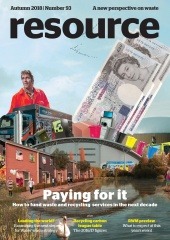An eye on the markets: Canned heat
Rick Hindley, Executive Director of Alupro, examines the drivers behind the continued upward trend in aluminium recycling
Packaging continues to dominate the headlines, as calls for radical change to packaging policy in the UK ramp up. A single-use plastic tax, the introduction of a deposit return scheme for plastic bottles, metal cans and glass bottles, reform of the Packaging Recovery Note (PRN) system, the approval of the EU Circular Economy Package – each of these interventions has significant implications. However, all that is clear right now is whatever policies are finally adopted by the UK Government and the devolved administrations will dramatically increase the cost to producers.
 Whilst the current policy agenda is being driven by plastic packaging, the unprecedented public interest in the material and the impact of its mismanagement on the environment, there will be widespread ramifications for other materials, including aluminium. Alupro is advocating that all policy instruments must be properly evaluated before any decisions are made; any new policy options should not have unintended consequences for aluminium packaging, the benefits of which are considerable – infinitely recyclable, intrinsic high value, and a truly circular material, 92 per cent of which is recycled within the UK and the EU.
Whilst the current policy agenda is being driven by plastic packaging, the unprecedented public interest in the material and the impact of its mismanagement on the environment, there will be widespread ramifications for other materials, including aluminium. Alupro is advocating that all policy instruments must be properly evaluated before any decisions are made; any new policy options should not have unintended consequences for aluminium packaging, the benefits of which are considerable – infinitely recyclable, intrinsic high value, and a truly circular material, 92 per cent of which is recycled within the UK and the EU.
The UK metal can market moved to 100 per cent aluminium in the second quarter of this year, following the conversion of the Ardagh can plant in Rugby to one that will only supply aluminium cans to the UK market. Ardagh supplies cans to high-volume segments of the drinks market, including Britvic, which in turn has exclusive agreements to make, distribute and market global brands on behalf of PepsiCo.
This conversion at the Ardagh can plant means that all Pepsi and Britvic cans made and filled in the UK are aluminium; it is estimated that this will result in a minimum 10,000 tonnes of additional aluminium cans being sold on the UK market.
This estimated increase will build on the strong can sales already seen this year, driven by the exceptional summer weather and England’s surprisingly strong performance in the World Cup. In addition, cans are fast becoming the packaging of choice for the craft beer sector, which continues to increase its market share.
 This article was taken from Issue 93
This article was taken from Issue 93And whilst the well-publicised shortage of CO2 has caused production issues across the board, cans require 50 per cent less CO2 than PET plastic, and therefore were less affected by the shortage. So good news continues to abound for aluminium cans.
The PRN figures for the second quarter of 2018 showed continued growth in recycling, with clean aluminium packaging collected from kerbside and on-the-go systems increasing by five per cent to 36,279 tonnes, compared to the same period last year, where 34,651 tonnes were collected for recycling. This is despite some reprocessors and exporters choosing not to become accredited this year due to the low PRN prices experienced over the previous year.
Importantly, the continuing increase in collection and recycling of aluminium packaging will generate more income for local authorities and commercial waste companies; approximately 94,000 tonnes of aluminium packaging were recycled in 2017, generating an estimated £75 million for both local authorities and waste reprocessors.
The recent issue of Alupro’s report, ‘Achieving an 85 per cent recycling rate within 2 years’, provides examples of the future shape of recycling, and the high levels of recycling that can be achieved in aluminium packaging. Global demand for used aluminium packaging remains strong and is forecast to remain so. Aluminium is well on course to achieve this year’s recycling target of 58 per cent, and our members are experiencing considerable interest in can and foil tray sales, as consumers, brands and retailers look for viable alternative packaging options. 






